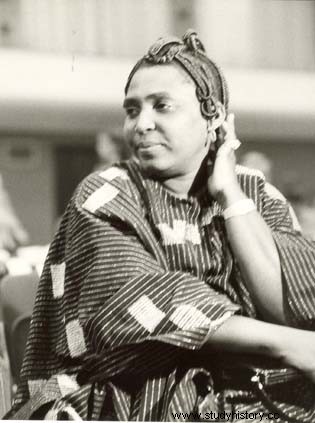Senegalese author, Mariama Bâ (1929 – 1981) rises from in his works Such a long letter and A Scarlet Song for the rights and status of women. She is involved in associations working for education and women's rights.
A brilliant student
 Mariama Bâ was born in Dakar, Senegal on April 17, 1929, into a wealthy Muslim family. His grandfather worked as an interpreter for the French colonial administration, his father as a civil servant. After her mother's death, Mariama was brought up mainly by her maternal grandparents, who had a rather traditional view of raising girls.
Mariama Bâ was born in Dakar, Senegal on April 17, 1929, into a wealthy Muslim family. His grandfather worked as an interpreter for the French colonial administration, his father as a civil servant. After her mother's death, Mariama was brought up mainly by her maternal grandparents, who had a rather traditional view of raising girls.
The little girl studies in a Koranic school and a French school, where she shines with her good results. After obtaining her primary school certificate at 14, she wants to continue her studies, but her grandparents believe that a girl does not need an education. It takes the intervention of his father so that his father can enter the Normal School of Rufisque, which trains teachers. After brilliant studies, she graduated in 1947.
The roots of a commitment
Mariama Bâ taught for twelve years, before being transferred to the Regional Education Inspectorate, as an inspector. Alongside her career, she married three times:she has three daughters with Bassirou Ndiaye, a daughter with Ablaye Ndiaye and five children with the deputy and minister Obèye Diop, whom she will divorce.
Her difficulties in accessing education as a girl, the inequalities she suffered and her experiences of marriage led her to take an interest in women's rights. Engaged in feminist associations, she began to give public speeches and write articles defending the status of women, advocating the education of girls and the balance of power in relations between women and men.
Such a long letter
In 1979, Mariama Bâ published her first novel A so long letter at New African Editions. In this epistolary novel, recently widowed Ramatoulaye writes a letter to her best friend Aïssatou. She evokes her conditions as a woman, wife, mother, those of her friend on whom her husband imposes a second wife and who chooses to leave him; so many subjects that are dear to the writer.
Through these life experiences, Mariama scratches social and religious traditions, highlights their impact on the status of women, values the female contribution to African societies and manifests women's aspirations to free themselves from inequalities. Such a long letter meets, as soon as it is released, the success and the approval of the public and the critics. The following year, Mariame won the Noma Prize at the Frankfurt Book Fair.
A scarlet song
After the success of such a long letter, Mariama Bâ writes a second novel:Un chant écarlate . She tells the love story between a Senegalese, Ousmane, and a Frenchwoman, Mireille, and the difficulties that their couple encounters because of cultural differences and the status of women. Mireille fails to adapt to Senegalese traditions, especially when her husband marries a second wife. The book criticizes the tyranny and weight of traditions, as well as the difficulties of relations between people from different cultures.
Mariama Bâ died of cancer on August 17, 1981, at the age of 52, before the release of Un chant écarlate . His articles and speeches have been collected in the book The Political Function of Written African Literature.
Mariama Bâ remains a source of inspiration for feminists around the world and for African women in particular.
